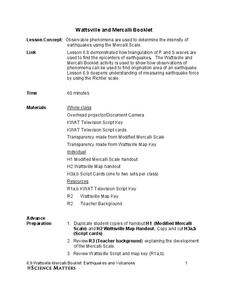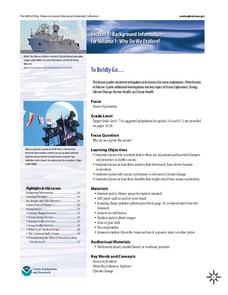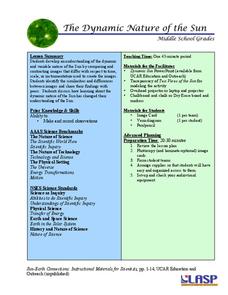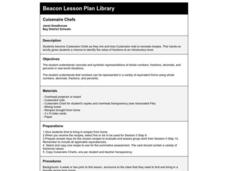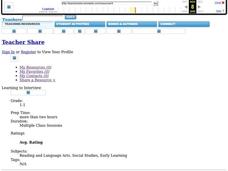Curated OER
Questioning
Practice making predictions by looking at the cover of a book. You can use The Hungry Thing, as suggested here, or any other book you may be reading in class. Use the predictions to talk about good reading strategies. A chart is included...
Curated OER
Respect
Investigate "respect" with your class. They will participate in a think/share activity in which they complete sentence starters about their personal experience with "respect." Then they view a video clip in which Holocaust survivors...
Curated OER
Pregnancy
Dispel the many myths and misunderstandings for teens regarding pregnancy. Health young scholars discuss the reproductive system, how conception occurs, and review new information through an excellent in-class game. Some wonderful...
Curated OER
It's Greek To Me!
In this language lesson, scholars use Greek root meanings to determine the meaning of words. After being shown how Greek roots are used in many words, such as, photosynthesis, pairs are given two excellent black line masters embedded in...
Curated OER
Rock On!
After five class sessions, young scientists will be able to identify common rock types: igneous, sedimentary, and metamorphic. This plan involves hands-on activities, includes various handouts and worksheets, and requires there to be...
Ascanius: The Youth Classics Institute
Anatomy and Simple Commands
Poor Joe is all in pieces, and he needs students to learn the Latin words for his body parts so that they can put him back together! Learners work as a class first to perform whole-body reconstruction, and then individually. In addition,...
Film Foundation
To Kill a Mockingbird: What Is a Movie?
The challenge film makers face when creating a film based on a novel or nonfiction text is the focus of a interdisciplinary resource that uses To Kill a Mockingbird to teach viewers how to read the visual images of film. A must-have...
NOAA
Importance of Deep-Sea Ecosystems – What Killed the Seeds?
Most drugs used today come from nature, so the discovery of new ecosystems in the deep sea is exciting from a medical perspective. Scholars develop their own bioassay to test germination rates in seeds.
Science Matters
Wattsville and Mercalli Booklet
There has been an earthquake! Can you listen to the description of damage given by callers in order to determine the epicenter? The 11th of 20 lessons has pupils read a script of one emergency caller. The class records the information on...
NOAA
To Boldly Go...
When we think of ocean exploration, many of us have visions of sunken pirate ships full of treasure or mysterious creatures of the deep. What really motivates deep-sea investigation? The first in a series of diverse six-part lessons...
Chicago Botanic Garden
Plant Phenology Data Analysis
Beginning in 1851, Thoreau recorded the dates of the first spring blooms in Concord, and this data is helping scientists analyze climate change! The culminating instructional activity in the series of four has pupils graph and analyze...
Curated OER
Cause or Effect
Catch the attention of your class by holding a ball and asking your learners what will happen if you let the ball go. Now that they're thinking of possible effects, introduce them to the day's topic: cause and effect. Present sentences...
Curated OER
Rhythm and Rhyme
Youngsters listen to poetry and music to understand that words are made of sounds. In this rhythm and rhyme lesson, students create songbooks of healthy eating songs. They will also act out pantomimes and dance to the music. Each...
Santa Monica-Malibu Unified School District
Parts of Speech Adjectives: Building Blocks of Grammar
How do you describe a jellyfish? Individuals write adjectives for Nomura's jellyfish, take notes, and check understanding with a formative assessment. Notes include the definition for adjectives, guiding questions to help writers...
Santa Monica-Malibu Unified School District
Parts of Speech Verbs: Building Blocks of Grammar
Pupils begin with a brain teaser, take notes, and formatively check understanding with a Chinese proverb. In addition to parts of speech, the resource also includes information about parts of a sentence. Teachers may extend instruction...
Curated OER
Yummy Gummy Subtraction
Here is a quick 15 minute lesson intended to introduce subtraction. Learners count and subtract gummy bears to complete 5 problems. The lessons suggest that the gummy bears can be saved and used the next day, but gummy bears get gross...
Curated OER
Decimals Decide Olympic Champions
The class discovers how a decimal can make all the difference in the Olympics. As they learn about decimal place values, they compare and contrast data and demonstrate decimal values using manipulatives.
Micron Technology Foundation
Early - Weather and Seasons
Young scientists from any region can take a scientific journey and be exposed to weather changes that include rain and snow.
PHET
The Dynamic Nature of the Sun
In this second instructional activity of the series, pupils learn to observe similarities and differences in photos of the sun and record them in a Venn diagram. Then, small groups practice the same skill on unique images before...
Chicago Botanic Garden
Plant Phenology Data Analysis
Scientists monitor seasonal changes in plants to better understand their responses to climate change, in turn allowing them to make predictions regarding the future. The last activity in the series of six has scholars analyze BudBurst...
Curated OER
To Quote or Not to Quote
Quotation marks are the focus of this resource. In it, youngsters discover how to correctly use punctuation marks. It is meant to be carried out over a three-day period. You could shorten it, but I wouldn't. The activities are...
Curated OER
Cuisenaire Chefs
Favorite family recipes and cuisenaire rods are used to help learners understand fractions. They bring in recipes from home and then use their cuisenaire rods to model the fractional values needed to prepare various dishes. A great way...
Curated OER
Learning to Interview
An authentic and engaging way to practice literacy skills, this lesson calls for young language arts pupils to conduct interviews with classmates and family members. First, pupils watch as the teacher models the interview process with a...
Curated OER
Y-Intercept and Slope Intercept Form
Alegebra amateurs identify the slope and the y-intercept given a linear equation in slope-intercept form by correctly completing some in class problems. They write the linear equation in slope-intercept form that corresponds to the given...










